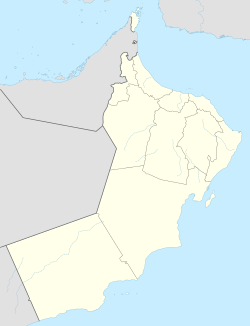
Oman, officially the Sultanate of Oman, is a country on the southeastern coast of the Arabian Peninsula in Western Asia and the oldest independent state in the Arab world. Located in a strategically important position at the mouth of the Persian Gulf, the country shares land borders with the United Arab Emirates to the northwest, Saudi Arabia to the west, and Yemen to the southwest, and shares marine borders with Iran and Pakistan. The coast is formed by the Arabian Sea on the southeast and the Gulf of Oman on the northeast. The Madha and Musandam exclaves are surrounded by the UAE on their land borders, with the Strait of Hormuz and the Gulf of Oman forming Musandam's coastal boundaries.
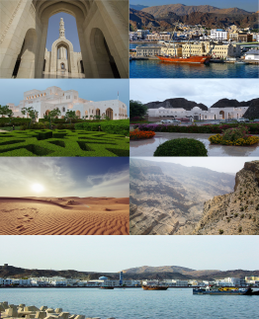
Muscat is the capital and is the most populated city in Oman. It is the seat of the Governorate of Muscat. According to the National Centre for Statistics and Information (NCSI), the total population of Muscat Governorate was 1.4 million as of September 2018. The metropolitan area spans approximately 3,500 km2 (1,400 sq mi) and includes six provinces called wilayat. Known since the early 1st century CE as an important trading port between the west and the east, Muscat was ruled by various indigenous tribes as well as foreign powers such as the Persians, the Portuguese Empire, the Iberian Union and the Ottoman Empire at various points in its history. A regional military power in the 18th century, Muscat's influence extended as far as East Africa and Zanzibar. As an important port-town in the Gulf of Oman, Muscat attracted foreign tradesmen and settlers such as the Persians and the Balochis. Since the ascension of Qaboos bin Said as Sultan of Oman in 1970, Muscat has experienced rapid infrastructural development that has led to the growth of a vibrant economy and a multi-ethnic society. Muscat is termed as a Beta - Global City by the Globalization and World Cities Research Network.

Qaboos bin Said Al Said was the Sultan of Oman from 23 July 1970 until his death. A fifteenth-generation descendant of the founder of the House of Al Said, he was the longest-serving leader in the Middle East and Arab world at the time of his death.

The Oman national football team represents Oman in men's international football and is controlled by the Oman Football Association. Although the team was officially founded in 1978, the squad was formed long before, and a proper football association was formed only in December 2005, The team represents both FIFA and Asian Football Confederation (AFC).
The Omani rial is the currency of Oman. It is divided into 1000 baisa.
Oman Air is the national airline of Oman. Based at Muscat International Airport in Seeb, Muscat; it operates domestic and international passenger services, as well as regional air taxi and charter flights. Oman Air is a member of the Arab Air Carriers Organization.

A khanjar is a traditional dagger originating from Oman. Worn by men for ceremonial occasions, it is a short curved sword shaped like the letter "J" and resembles a hook. It can be made from a variety of different materials, depending on the quality of its craftsmanship. It is a popular souvenir among tourists and is sold in souqs throughout the region. A national symbol of the sultanate, the khanjar is featured on Oman's national emblem and on the Omani rial. It also features in logos and commercial imagery by companies based in Oman.

Ali Abdullah Harib Al-Habsi is an Omani retired professional footballer who played as a goalkeeper.

Oman is an absolute monarchy in which all legislative, executive, and judiciary power ultimately rests in the hands of the hereditary sultan, and in which the system of laws is based firmly on Islamic sharia. Although a report by the U.S. State Department, based on conditions in 2010, summed up the human rights situation in the country by asserting that the government “generally respected the human rights of its citizens,” the details in the report itself strongly indicate otherwise, and several international human-rights groups have described the state of human rights in Oman in highly critical terms. According to a report, on 20 December 2015, poet and television producer Nasser al-Badri was summoned by the Police Special Section and detained for 12 days without charge and without trial. The report added that the Omani Observatory for Human Rights said that al-Badri was detained because of tweets he posted criticising Sultan Qaboos and the state of the country’s economy. Article 41 of Oman’s statute (constitution) criminalizes any criticism of the sultan, stating that the sultan’s ‘person is inviolable and must be respected and his orders must be obeyed’.
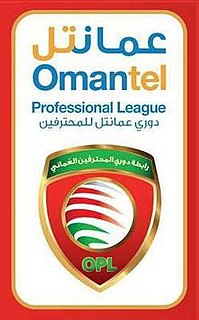
The Oman Professional League, previously known as the Omantel Elite League is the top division of the Oman Football Association, and was officially created in 1976. Currently the most successful team in the league is Dhofar with a total of eleven titles to their name.

Oman Telecommunications Company (Omantel) is the first telecommunications company in Oman and is the primary provider of internet services in the country. Omantel ac. The government of Oman owns a 51% share in Omantel.
The 2008–09 Omani League was the 33rd edition of the top football league in Oman. It began on 23 October 2008 and finished on 27 May 2009. Al-Oruba SC were the defending champions, having won the previous 2007–08 Omani League season. On Wednesday, 27 May 2009, Al-Nahda Club lost 1-0 away in their final league match against Sur SC and emerged as the champions of the 2008–09 Omani League with a total of 45 points.
The 2009–10 Omani League was the 34th edition of the top football league in Oman. It began on 12 September 2009 and finished on 7 May 2010. Al-Nahda Club were the defending champions, having won the previous 2008–09 Oman League season. On Friday, 7 May 2010, Al-Suwaiq Club played out a 1–1 draw away in their final league match against Al-Nasr S.C.S.C. and emerged as the champions of the 2009–10 Oman Mobile League with a total of 44 points.
The 2010–11 Omani League was the 35th edition of the top football league in Oman. It began on 1 November 2010 and finished on 30 April 2011. Al-Suwaiq Club were the defending champions, having won the previous 2009–10 Oman Mobile League season. On Saturday, 30 April 2011, Al-Suwaiq Club won 0–3 away in their final league match against Al-Nasr S.C.S.C. and emerged as the champions of the 2010–11 Oman Mobile League with a total of 43 points.
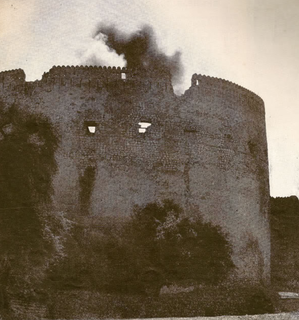
The Jebel Akhdar War or the Oman War, also known as Jebel Akhdar rebellion broke out in 1954 and again in 1957 in Oman, as an effort by the local Omanis in the interior of Oman led by their elected Imam, Ghalib Alhinai, to protect the Imamate of Oman from the occupation plans of sultan Said bin Taimur, backed by the British government, who were eager to gain access to the oil wells in the interior lands of Oman. Sultan Said received direct financing to raise an armed force to occupy the Imamate of Oman from Iraq Petroleum Company (IPC), a consortium of oil companies that was majorly owned by what is known today as Royal Dutch Shell, Total, ExxonMobil and British Petroleum (BP); the latter was majority-owned by the British government. The Imamate was eventually supported by Arab states. The war lasted until 1959, when the British armed forces decided to take on direct interventions using air and ground attacks on the Imamate, which won the Sultanate the war. The declarations signed by the sultans of Muscat to consult the British government on all important matters, the unequal trade treaties signed by the two sides favoring British interests, the cessation of the Omani Kuria Muria islands to the British, and the vast control over the Sultanate's government ministries, including defense and foreign affairs, exerted by the British rendered the Sultanate a de facto British colony. The UN General Assembly adopted the 'Question of Oman' resolution in 1965, 1966 and again in 1967 that called upon the British government to cease all repressive action against the locals, end British control over Oman and reaffirmed the inalienable right of the Omani people to self-determination and independence.
The 2011–12 Oman Elite League was the 36th edition of the top football league in Oman. It began on 25 September 2011 and was scheduled to finish on 19 May 2012, but for the first time in the history of Omani League, the league title had to be decided by a playoff. Al-Suwaiq Club were the defending champions, having won the previous 2010–11 Elite League season. On Monday, 21 May 2012, Fanja SC won the Championship Final match against Al-Shabab Club 7–6 on penalties after the match had ended 3–3 after extra time and emerged as the champions of the 2011–12 Oman Elite League.
The 2012–13 Oman Elite League was the 37th edition of the top football league in Oman. It began on 4 October 2012 and was scheduled to finish on 19 May 2013, but for the second season running, the league title had to be decided by a playoff. Fanja SC were the defending champions, having won the previous 2011–12 Elite League season. On Wednesday, 22 May 2013, Al-Suwaiq Club won the Championship Final match against Fanja 3–1 and emerged as the champions of the 2012–13 Oman Elite League.
The 2013-14 Oman Professional League is the 38th edition of the top football league in Oman. The Oman Football League got the seal of approval of a professional league on 1 September 2013 and will henceforth be called the Omantel Professional League (OPL). The season began on 13 September 2013, and concluded on 16 May 2014. Al-Suwaiq Club were the defending champions, having won their third title in the previous 2012–13 Elite League season. On Sunday, 28 April 2014, Al-Nahda Club were crowned the champions of the inaugural Oman Professional League with one game remaining after Al-Suwaiq Club edged out ten-man Fanja SC 5-3. Fanja SC needed a draw or a win on Sunday to prolong the fight for the OPL title, after Al-Nahda Club defeated Saham SC 4-3 to take their tally to 51 points, but its defeat dashed any hopes for the eight-time winners to match the record of nine titles, held by Dhofar S.C.S.C. in the 37-year-old history of Oman's top flight competition.
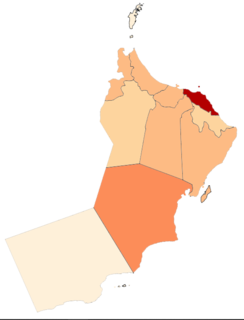
The COVID-19 pandemic in Oman is part of the worldwide pandemic of coronavirus disease 2019 caused by severe acute respiratory syndrome coronavirus 2. The virus was confirmed to have reached Oman on 24 February 2020 when two citizens tested positive for COVID-19 after returning from Iran. As of 20 July, the total number of cases registered in the sultanate is 68,400, of which above 60%; 45,150 cases have recovered and 326 have died. Initially, the majority of the cases and deaths occurred in the expatriate community. By July, as the pandemic entered its fourth month in the country, the majority of the cases and deaths had occurred among the citizens.
